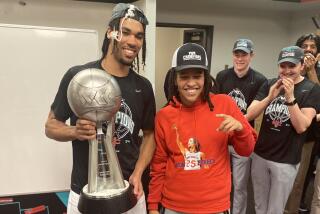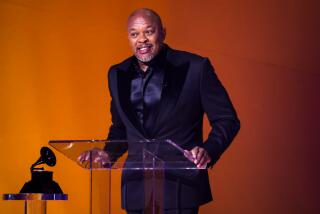A Woman Athlete With a Pacemaker: She’s All Heart
- Share via
FRESNO — Once, while attending Buena High School in Ventura, Ann Menke-Wilson broke her ankle playing basketball and went to the school prom wearing a cast with her formal.
This season the curly-haired, 5-foot-8 senior guard lost 15 pounds and overcame a torn knee ligament to become a starter for the women’s basketball team at California State University at Fresno. Her smile reveals a discolored tooth, the result of an opponent’s unintentional head butt that killed the tooth’s nerve.
That dedication to playing persuaded friends long ago that nothing would keep Menke-Wilson, 21, off a basketball court, but her recovery three years ago from a pacemaker operation and her return to a grueling schedule of games and practices within two weeks surprised not only her friends but the medical community as well.
Installed Below Shoulder
That was when Menke-Wilson, then an 18-year-old freshman, had a pacemaker the size of a pocket watch installed just below her right shoulder. It is surgery that--so far--has paid big dividends for herself and the university. Last week she scored a career-high 18 points in a 70-69 overtime victory over the University of Colorado.
“I’m going to enter this in the medical literature,” assistant Fresno State University team physician William Kennedy said shortly afterward. “We did a literature search and it’s not unusual for young people to have pacemakers, but we couldn’t find anyone using a pacemaker who was competing at this level. What she did says that even though her condition appears to preclude playing, it is possible to overcome that problem.”
Kennedy said that Menke-Wilson, who will start against San Diego State University in San Diego tonight and against California State University at Long Beach at 3 p.m. Saturday, had a healthy heart, but that a defective nerve failed to send impulses from the upper chamber to the lower one. That caused the lower chamber to slow periodically to dangerously low levels of 25 beats per minute, well below the normal rate of 60-90.
The physician said a wire from the pacemaker stimulates the lower chamber of her heart to beat normally when it falls below healthy levels, and that Menke-Wilson is in little danger playing basketball.
“The risk (at any time) is pacemaker failure. A wire could break or the batteries might run out,” he said. “But I don’t think sports offers an additional risk. Failure is as likely to occur at rest as it is at exercise.
“The reason is that the pacemaker is a durable piece of equipment. It can take a lot of force. The pacemaker is implanted between the skin and the muscle and the body grows around the wires. It becomes rigidly attached. After a week or two, it can stay for life.
“The cardiologist can put a scanner over the pacemaker periodically and check its functions. At some point she’ll need to have it changed. My guess is in five or 10 years.”
In the meantime Menke-Wilson reports no ill effects, even though she works more rigorously than most of the estimated 475,000 living users of pacemakers in the United States, whose average age is 71, according to Medtronic Inc. of Minneapolis. The firm is one of the nation’s largest manufacturers of pacemakers.
After playing all 45 minutes, scoring the winning basket and being knocked to the floor several times in the overtime victory over Colorado last week, Menke-Wilson said she was playing the best basketball of her life.
Eight of 14 Shots
“My confidence is greatly multiplied,” she said following the game in which she made eight of 14 shots, all from long range, and both of her free throws. “I have a lighter brace on my knee than I had last year, which makes me more mobile.”
Part of the mobility comes from losing 15 pounds before her wedding to Ralph Wilson, 23, the high school sweetheart she married last summer. Sitting next to her husband, a high school history teacher and girls’ basketball coach, in their apartment near campus, she said the marriage has also helped her confidence.
“Knowing I can talk about things is a big help,” she said. “He may not give me the answers I want, but I know he’ll be there.”
Having people to talk with became imperative shortly after she arrived at Fresno State and learned she would need a pacemaker.
It became obvious during her first few months at the school that something was wrong. When she ran down the court she tripped frequently for no apparent reason. Then Menke-Wilson blacked out and tumbled down three rows of seats while cleaning the Fresno State football bleachers during a fund-raiser with the women’s basketball team.
When the backache from that fall did not respond to treatment, school athletic trainers started asking questions, wondering if her blackout and back pain were related. Menke-Wilson revealed that her blackouts had started in the fourth grade, but that she had never told anyone.
Kind of Dumb
“The trainer and I were just talking when finally I got up enough nerve to ask, ‘Is this normal?’ ” she said. “Which is kind of dumb now, because obviously it isn’t (normal).
“Maybe I never told anyone because I was afraid something was wrong and I figured if I ignored it, it wouldn’t hurt me,” she said. “I was always fine afterwards anyway. “I never thought it was related to tripping.”
When trainer Ed Ferreira told Dr. Kennedy about the symptoms, he ordered Menke-Wilson to wear a portable heart monitor for 24 hours, including basketball practice, during which she strapped the monitor box to her back.
Kennedy discovered no link between the blackouts and her slow-healing back. But, in a conference in his office he told the young player that the tests had revealed a low heart rate that caused the blackouts by sending insufficient amounts of blood to the brain. He said she had a heart problem. After she saw a cardiologist, Ferreira told her she would need a pacemaker.
“At first she took it very well,” he said. “I don’t think it really sunk in when we talked. When it settled in . . . she was very quiet and very sad. It was an emotion of fear. She could not really understand why and what was going to happen. There are so many unknowns.”
Reacted Stoically
Menke-Wilson’s teammates said she reacted stoically, but a few nights later she took off from her dormitory, running, into the rain. Three teammates split up to search for her and found her jogging on the school track in a downpour.
“It was the first time you could tell she was really scared,” said teammate Shannon McGee, 21, of San Jose. “She wasn’t very emotional and didn’t know how to ask for help. . . . We brought her back and told her that if you need to talk, we’re here for you. I watched her and thought, ‘Gosh, if it was me, I wonder how I’d handle it?’ ”
“It was to the point where everything had come to a head and I realized what was happening,” Menke-Wilson said. “I said, ‘I’m 18. I’m not a grandparent. This happens to somebody’s great-aunt, not to you.’
“My teammates told me it was all right--you have people here. Just don’t go out and do dumb things on your own. I remember how concerned they were. They were kind of motherly about it.
“I’ve never been real open. I think just knowing they were there was enough.”
It also helped to know she could continue to play basketball. As soon as she learned she would need the pacemaker, Menke-Wilson asked if she could still play. Doctors said they saw no reason why she shouldn’t, and three days after the surgery, they ordered her to begin riding an exercise bicycle for rehabilitation. Ten days later, she had rejoined team practices. She said she does not feel the pacemaker.
“I think a lot of her concern and worry disappeared when we started pushing her right away,” Ferreira said.
Menke-Wilson said she had also worried about being unable to continue playing when she tore the anterior cruciate ligament in her left knee in the summer before her junior year. The knee required arthroscopic surgery and the removal of cartilage. At that time, a school doctor advised her to give up basketball.
Couldn’t Just Quit
Menke-Wilson, who plays with a large knee brace as a result of the injury, declined. “I’ve never just quit on something,” she said. “I’ve been doing it for eight years in high school and college. It’s got to be a pretty good reason for me to quit, and I didn’t think the pacemaker and the knee injury were good enough.
“I enjoy basketball and the people involved. I did not want to quit being part of the group of people I’m with. Shannon was my maid of honor at my wedding. They were very supportive and understanding and probably wondering what else could happen to me. I didn’t realize how supportive they had been until afterward. What they told me when I had the pacemaker was that whatever I wanted to do, whether I continued basketball or not, they’d be there. For dumb freshmen, they acted very maturely as I look back on it.”
More to Read
Go beyond the scoreboard
Get the latest on L.A.'s teams in the daily Sports Report newsletter.
You may occasionally receive promotional content from the Los Angeles Times.










